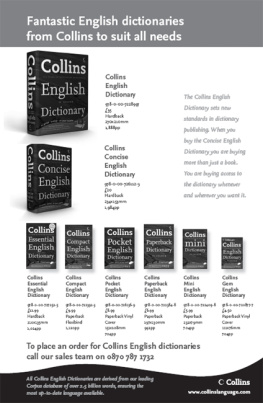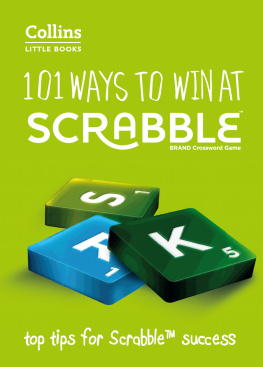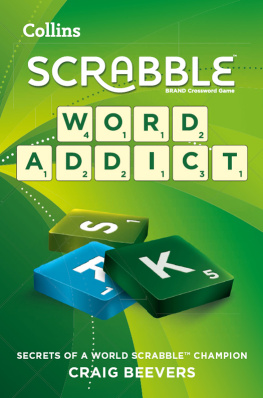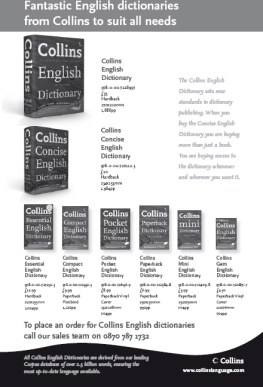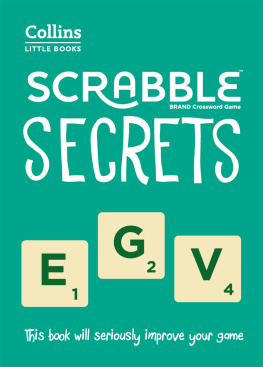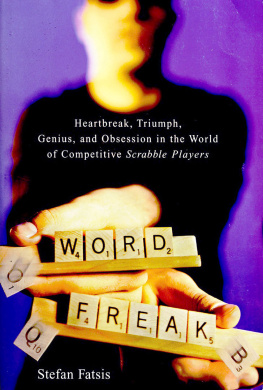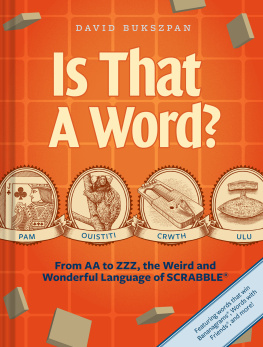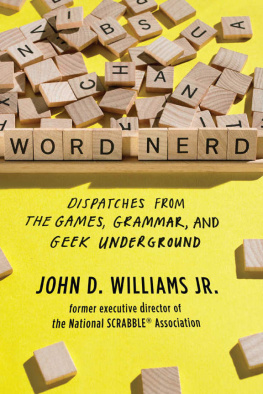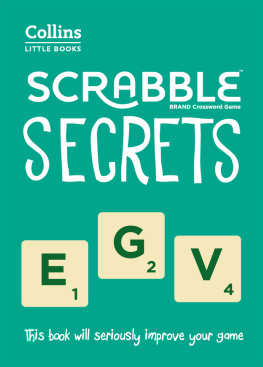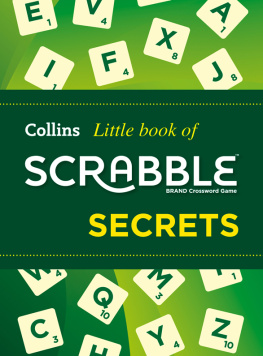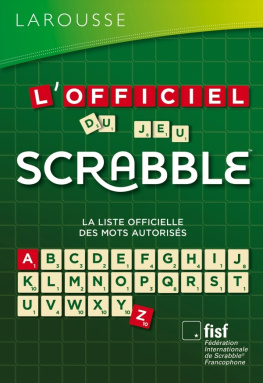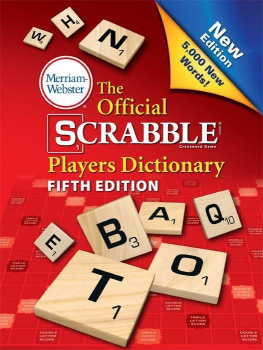
HarperCollins Publishers
Westerhill Road
Bishopbriggs
Glasgow
G64 2QT
First edition 2009
Reprint 10 9 8 7 6 5 4 3 2 1 0
EPUB Edition June 2011 ISBN 978-0-00-744508-0
HarperCollins Publishers 2009
Scrabble is a registered trademark of J. W. Spear & Sons Ltd, a subsidiary of Mattel, Inc. 2009 Mattel, Inc.
Collins is a registered trademark of HarperCollins Publishers Limited
www.collinslanguage.com
A catalogue record for this book is available from the British Library
Printed in Italy by
LEGO Spa, Lavis (Trento)
All rights reserved under International and Pan-American Copyright Conventions. By payment of the required fees, you have been granted the non-exclusive, non-transferable right to access and read the text of this e-book on screen. No part of this text may be reproduced, transmitted, downloaded, decompiled, reverse engineered, or stored in or introduced into any information storage and retrieval system, in any form or by any means, whether electronic or mechanical, now known or hereinafter invented, without the express written permission of HarperCollins.
Introducing Scrabble
Games are strange things. Some, like chess and backgammon, look terribly complicated to an onlooker who doesnt know the rules. It seems that you must have to be some sort of expert to play these games. Scrabble is different somehow.
Even if someone had never seen the game in their life before, it probably wouldnt take them long to pick up the general idea if they watched a game being played. The scoring might take them a little longer but, fundamentally, its easy enough just place the letters on the board to form words, like in a crossword. This makes most people think that once theyve grasped that, they know all they need to know perhaps all there is to know about the game.
This is very far from the truth. Scrabble, like chess, backgammon or bridge, has a high skill factor. And that doesnt just mean knowing lots of words. A strong player will certainly know a lot of words that the average person, even the average reasonably well-educated person, will never have heard of. But you have to know the right words. A professor of English will find it no help at all in Scrabble to know words like CATACHRESTICAL or SOMNILOQUENCE. You can beat the Prof. if you know words like OURIE and ZAX.
Scrabble factsIn 1985, two Royal Marines on a training exercise on Brabant Island, Antarctica, fell down a crevasse; luckily, one of them had a Scrabble set in his kit-bag and they passed the five days that they waited to be rescued playing Scrabble.
Increasing your enjoyment
A game of Scrabble is basically a series of problems. How many times have you yelled in frustration at picking too many vowels or consonants, or cursed the fates for giving you an unwanted J, Q, X or Z? How often have you looked at the tiles on your rack and thought, I bet these make a seven-letter word, but not been able to work out what it was? How much more fun would the game be if you knew how to deal with these situations?
Scrabble factsIn a two-person game, most people playing with family and friends will average between 180 and 300 points per game. Stronger players can average more than 400 points.
Making the most of good tiles on your rack and limiting the damage from bad ones is what makes your game more enjoyable, and improves your chances of winning. And thats what this book is all about.
Scrabble factsThe highest-ever score for a single word was 392 forCAZIQUES, played by Karl Khoshnaw of Richmond, Surrey, in 1982. The highest score for a game is a massive 1049 by Phil Appleby of Lymington, Hampshire.
It wont happen automatically. Itll take a bit of concentration, a bit of practice, a bit of memory work. But if you enjoy Scrabble already, reading this book and taking on board what it suggests will bring you a lot more success at the game, and more importantly a lot more pleasure.
Who invented Scrabble?
Alfred Butts was an architect, but in the 1930s he was unemployed as a result of the Great Depression. He was also a word-game enthusiast, doing crosswords and tinkering with anagrams.
First there was Lexiko
Hoping to make some money, he developed a game called Lexiko. This involved players drawing seven tiles, then simply taking turns to discard tiles and draw new ones until they could make a seven-letter word. The first player to do so won. There was no board, no points and no element of interlocking your word with what had already been played. No games manufacturer was interested in producing it, partly because in the Depression most people presumably had little money to spend on games, but partly, one suspects, because it sounds a bit boring.
Scrabble factsEarly names for Scrabble includedLexiko,Criss-CrosswordsandIt.
Butts then introduced point values for the different letters. When a player had won a round by playing a seven-letter word, the others could play whatever words they could make from their hand, and lose the point values of the remaining tiles.
Determined as ever, Alfred tried again to have the game produced commercially, but still with no success. As an architect, Butts would have known that everything takes time, whether building a house or perfecting a game. He kept refining his invention, and eventually added the board, the premium squares and the crossword-style building up of words that we know from the game today.
Scrabble is born
By now, you might think that the manufacturers would have been falling over themselves to produce the game, but still Butts had no success. In 1939 he met James Brunot, a civil servant with an entrepreneurial streak. Brunot was immediately intrigued by the game. He played around with the idea, refined it a bit more and, like Butts, tried to get it onto the market. But it was now the early 1940s, and the world had more pressing matters to attend to. Finally, in 1949, Brunot formed his own business, the Production and Marketing Company, and the game by now, after a few more name changes, called Scrabble was finally ready to go into the shops.
Scrabble factsButts based the frequency of letters in the Scrabble set on how often each occurred in headlines in the New York Times, the Herald Tribune and the Evening Post.
Unfortunately, even after 18 years or so of development, Scrabble was still no overnight success. Sales were slow, and Brunot was losing money. In the first three years, no more than 20,000 sets were sold. Things were looking grim for Alfred and James, and Scrabble might well have faded away there and then. Then Jack Strauss went on holiday.
Holiday success
Strauss was a shopkeeper, and he discovered Scrabble while on a summer break with some friends. He loved the game and, on his return to work, promptly placed an order and organized a major promotion for the game in the store. This might not have mattered much if Jack Strauss had just been any shopkeeper. In fact, he was the chairman of Macys, one of the largest department stores in New York. With that kind of power to push it, Scrabble was well and truly on its way. Sales in the low thousands were transformed into millions, and Brunots and Butts long struggle was over.
Next page
